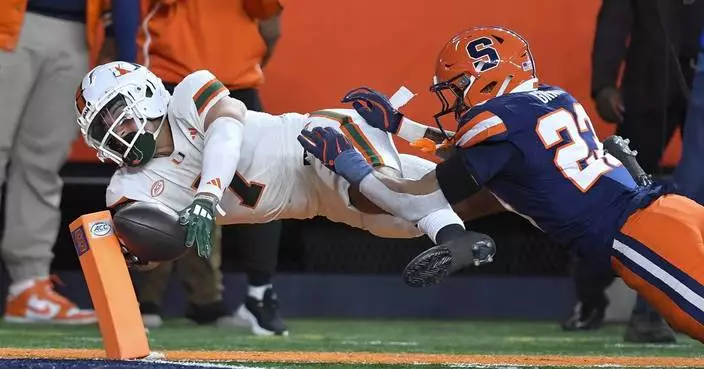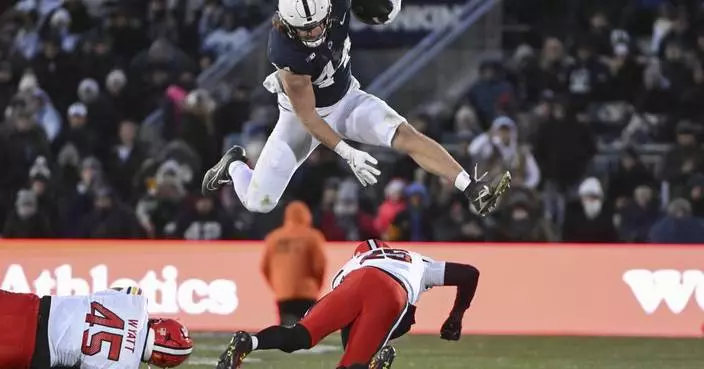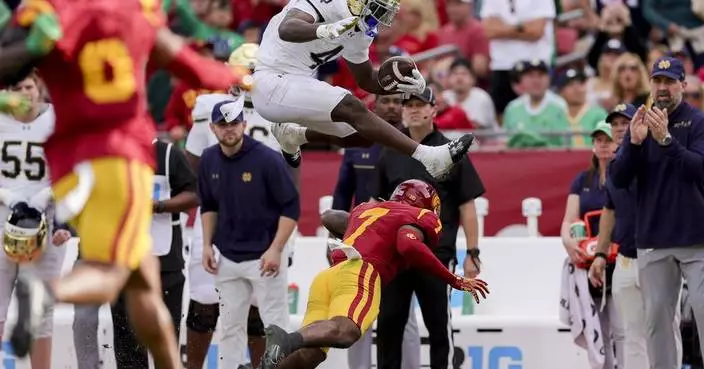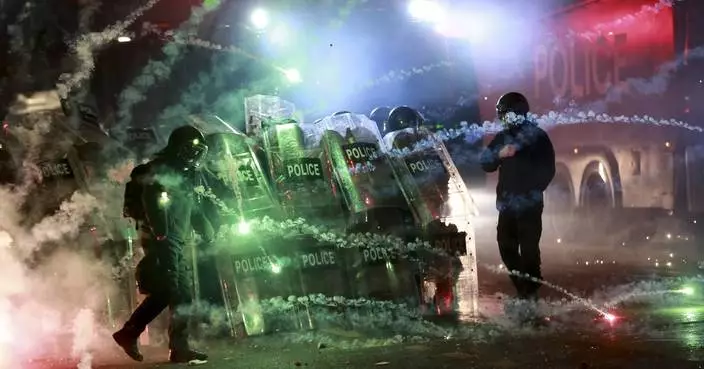CHAPEL HILL, N.C. (AP) — Hollywood Smothers slipped through the middle of the line for a 2-yard touchdown with 25 seconds left to help N.C. State beat rival North Carolina 35-30 on Saturday night in the Tar Heels' final game under Mack Brown.
Smothers' short TD run capped the go-ahead 75-yard drive that pushed the Wolfpack (6-6, 3-5 Atlantic Coast Conference) to bowl eligibility. The key play was CJ Bailey's deep ball to Noah Rogers, who snagged a 44-yard catch while taking contact from two defenders to set up the go-ahead score.
That capped a wild finish that saw the Tar Heels (6-6, 3-5) take a 30-29 lead on Omarion Hampton's 47-yard catch and run to the end zone with 1:51 left in a huge day for UNC's top weapon.
“These kids just get up and fight — these grown men get up and fight, and I'm proud of them,” Wolfpack coach Dave Doeren said. “Every time they made a play on their sideline, we responded with a play on our sideline.”
Hampton ran for 185 yards and a touchdown to go with four catches for 78 yards.
“I'm absolutely amazed that they were able to compete like they did tonight and play as hard as they did, with all the pressure on them and with the uncertainty in their future,” Brown said. “So I'm really, really proud of them.”
When it was over, the teams scuffled and had to be separated near midfield after at least one N.C. State player tried to plant a Wolfpack flag on UNC's home field. That came as UNC posted a thank you to Mack and wife Sally Brown on the video board before the teams headed to opposite tunnels — with Wolfpack players celebrating in front of their fans and even doing somersaults while the Tar Heels headed somberly to their locker room.
N.C. State: N.C. State was picked fourth in the ACC, but an unimpressive opening-night win against Western Carolina foreshadowed trouble. There were blowout losses to Tennessee and Clemson, as well as home losses to instate foes Duke and Wake Forest before last weekend's close loss at Georgia Tech set up this win-to-bowl scenario.
UNC: The Tar Heels were coming off a lopsided loss at Boston College, which killed optimism about the team's trajectory during a three-game win streak immediately preceding it. Then came the announcement that Brown wouldn't return as coach on Tuesday to set this up as a farewell moment for the winningest coach in program history who also led Texas to the 2005 national title.
The rivalry chippiness got going quickly when N.C. State offensive lineman Timothy McKay went low for a block and hit the planted left leg of Kaimon Rucker, leaving the Tar Heels’ pass rusher face down on the turf in pain in the first quarter. As trainers tended to Rucker — who ultimately was helped to the tunnel and didn’t return — fellow UNC linemen Jahvaree Ritzie and Desmond Evans stood near the middle of the field pointing and yelling toward Wolfpack players gathered on the sideline.
Two possessions later, officials declared offsetting unsportsmanlike-conduct penalties on every player on the field after a post-play bit of tangled jawing. And in the second period, UNC offensive lineman Howard Sampson was flagged for unnecessary roughness after running in late after a big run by Hampton to hit Wolfpack cornerback Brandon Cisse late and leave him shaken up.
Afterward, Rucker arrived to talk to reporters on crutches and wearing a boot on his lower left leg, saying he had a fractured fibula.
Both the Wolfpack and Tar Heels await bowl destinations — with the latter also awaiting the hiring of their next coach.
Get poll alerts and updates on the AP Top 25 throughout the season. Sign up here. AP college football: https://apnews.com/hub/ap-top-25-college-football-poll and https://apnews.com/hub/college-football
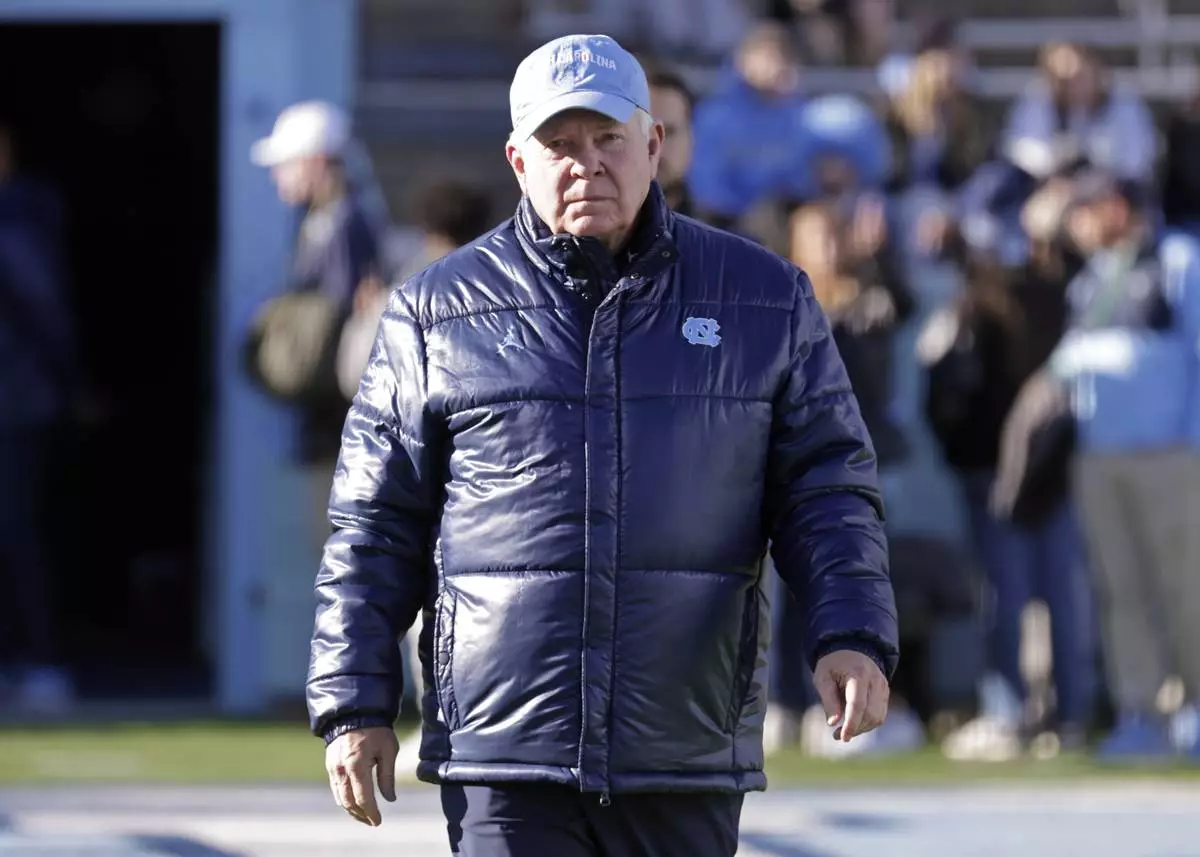
North Carolina head coach Mack Brown walks onto the field before an NCAA college football game against North Carolina State, Saturday, Nov. 30, 2024, in Chapel Hill, N.C. (AP Photo/Chris Seward)
WASHINGTON (AP) — President-elect Donald Trump has nominated Kash Patel to serve as FBI director, turning to a fierce ally to upend America’s premier law enforcement agency and rid the government of perceived “conspirators.” It’s the latest bombshell Trump has thrown at the Washington establishment and a test for how far Senate Republicans will go in confirming his nominees.
The selection is in keeping with Trump's view that the government's law enforcement and intelligence agencies require a radical transformation and his stated desire for retribution against supposed adversaries. It shows how Trump, still fuming over years of federal investigations that shadowed his first administration and later led to his indictment, is moving to place atop the FBI and Justice Department close allies he believes will protect rather than scrutinize him.
Patel “played a pivotal role in uncovering the Russia, Russia, Russia Hoax, standing as an advocate for truth, accountability, and the Constitution,” Trump wrote Saturday night in a social media post.
Patel’s nomination sets up what’s likely to be an explosive confirmation battle in the Senate not long after Trump’s first pick to lead the Justice Department, Matt Gaetz, withdrew his nomination amid intense scrutiny over sex trafficking allegations.
Patel is a lesser-known figure, but his nomination was still expected to cause shockwaves. He's embraced Trump’s rhetoric about a “deep state,” called for a “comprehensive housecleaning” of government workers who are disloyal to Trump and has referred to journalists as traitors, promising to try to prosecute some reporters.
Trump’s nominees will have allies in what will be a Republican-controlled Senate next year, but his picks are not certain of confirmation. With a slim majority, Republicans can only lose a few defectors in the face of expected unified Democratic opposition — though as vice president, JD Vance would be able to break any tie votes.
But the president-elect had also raised the prospect of pushing his selections through without Senate approval using a congressional loophole that allows him to make appointments when the Senate is not in session.
Patel would replace Christopher Wray, who was appointed by Trump in 2017 but quickly fell out of favor with the president and his allies. FBI directors have 10-year terms that are meant to inoculate them from political influence.
His removal isn’t unexpected given Trump’s long-running public criticism of him and the FBI, particularly in the aftermath of federal investigations — and an FBI search of his Mar-a-Lago estate for classified documents two years ago — that resulted in indictments that are now poised to evaporate.
In his final months in office, Trump unsuccessfully pushed the idea of installing Patel as the deputy director at either the FBI or CIA in an effort to strengthen the president’s control of the intelligence community. William Barr, Trump’s attorney general, wrote in his memoir that he told then-chief of staff Mark Meadows that an appointment to Patel as deputy FBI director would happen “over my dead body.”
“Patel had virtually no experience that would qualify him to serve at the highest level of the world’s preeminent law enforcement agency,” Barr wrote.
Patel’s past proposals, if carried out, would lead to convulsive change for an agency tasked not only with investigating violations of federal law but also protecting the country from terrorist attacks, foreign espionage and other threats.
He's called for dramatically reducing the agency's footprint, a perspective that sets him apart from earlier directors who have sought additional resources for the bureau, and has suggested closing down the bureau's headquarters in Washington and “reopen it the next day as a museum of the deep state” — Trump's pejorative catch-all for the federal bureaucracy.
And though the Justice Department in 2021 halted the practice of secretly seizing reporters' phone records during leak investigations, Patel has said he intends to aggressively hunt down government officials who leak information to reporters and change the law to make it easier to sue journalists.
During an interview with Steve Bannon last December, Patel said he and others “will go out and find the conspirators not just in government but in the media.”
"We’re going to come after the people in the media who lied about American citizens who helped Joe Biden rig presidential elections,” Patel said, referring to the 2020 presidential election in which Biden, the Democratic challenger, defeated Trump. “We’re going to come after you, whether it’s criminally or civilly. We’ll figure that out. But yeah, we’re putting you all on notice.”
Trump also announced Saturday that he would nominate Sheriff Chad Chronister, the top law enforcement officer in Hillsborough County, Florida, to serve as the administrator of the Drug Enforcement Agency. He has worked closely with Trump's choice for attorney general, Pam Bondi.
Patel, the child of Indian immigrants and a former public defender, spent several years as a Justice Department prosecutor before catching the Trump administration's attention as a staffer for the House Permanent Select Committee on Intelligence.
The panel’s then-chairman, Rep. Devin Nunes, R-Calif., was a strong Trump ally who tasked Patel with running the committee’s investigation into Russian interference in the 2016 campaign. Patel ultimately helped author what became known as the “Nunes Memo,” a four-page report that detailed how it said the Justice Department had erred in obtaining a warrant to surveil a former Trump campaign volunteer. The memo’s release faced vehement opposition from Wray and the Justice Department, who warned that it would be reckless to disclose sensitive information.
A subsequent inspector general report identified significant problems with FBI surveillance during the Russia investigation, but also found no evidence that the FBI had acted with partisan motives in conducting the probe and said there had been a legitimate basis to open the inquiry.
The Russia investigation fueled Patel's suspicions of the FBI, the intelligence community and also the media, which he has called “the most powerful enemy the United States has ever seen.” Seizing on compliance errors in the FBI’s use of a spy program that officials say is vital for national security, Patel has accused the FBI of having “weaponized” its surveillance powers against innocent Americans.
Patel parlayed that work into influential administration roles on the National Security Council and later as chief of staff to acting Defense Secretary Christopher Miller.
He continued as a loyal Trump lieutenant even after he left office, accompanying the president-elect into court during his criminal trial in New York and asserting to reporters that Trump was the victim of a “constitutional circus.”
And he found himself entangled in Trump’s legal woes, appearing two years ago before a federal grand jury that investigated Trump’s hoarding of classified documents at his Mar-a-Lago estate in Florida.
Typically though not always, presidents retain the director they’ve inherited: Biden, for instance, kept Wray in place even though the director was named by Trump, and former President Barack Obama asked Robert Mueller to stay on an extra two years even though Mueller was tapped by Obama’s predecessor, George W. Bush.
Trump had openly flirted with firing Wray during his first term, taking issue with Wray’s emphasis on the election interference threat from Russia at a time when Trump was focusing on China. Wray also described antifa, an umbrella term for leftist militants, as an ideology rather than an organization, contradicting Trump, who wants to designate it as a terror group.
The low-key FBI director had been determined to bring stability to an institution riven by turbulence following the May 2017 firing of James Comey by Trump amid an FBI investigation into potential ties between Russia and Trump’s 2016 campaign.
Wray sought to turn the page on some of the controversies of Comey’s tenure. The FBI, for instance, fired a lead agent from the Russia investigation who sent derogatory text messages about Trump during the course of the inquiry and sidelined a deputy director under Comey who was a key figure in the probe. Wray also announced dozens of corrective actions meant to prevent some of the surveillance abuses that tainted the Russia investigation.
The FBI has worked to protect Trump this year following multiple assassination attempts and disrupted an Iranian murder-for-hire plot targeting the president-elect that resulted in criminal charges unsealed in November.
Associated Press writer Jill Colvin in New York and Fatima Hussein in West Palm Beach, Florida, contributed to this report.
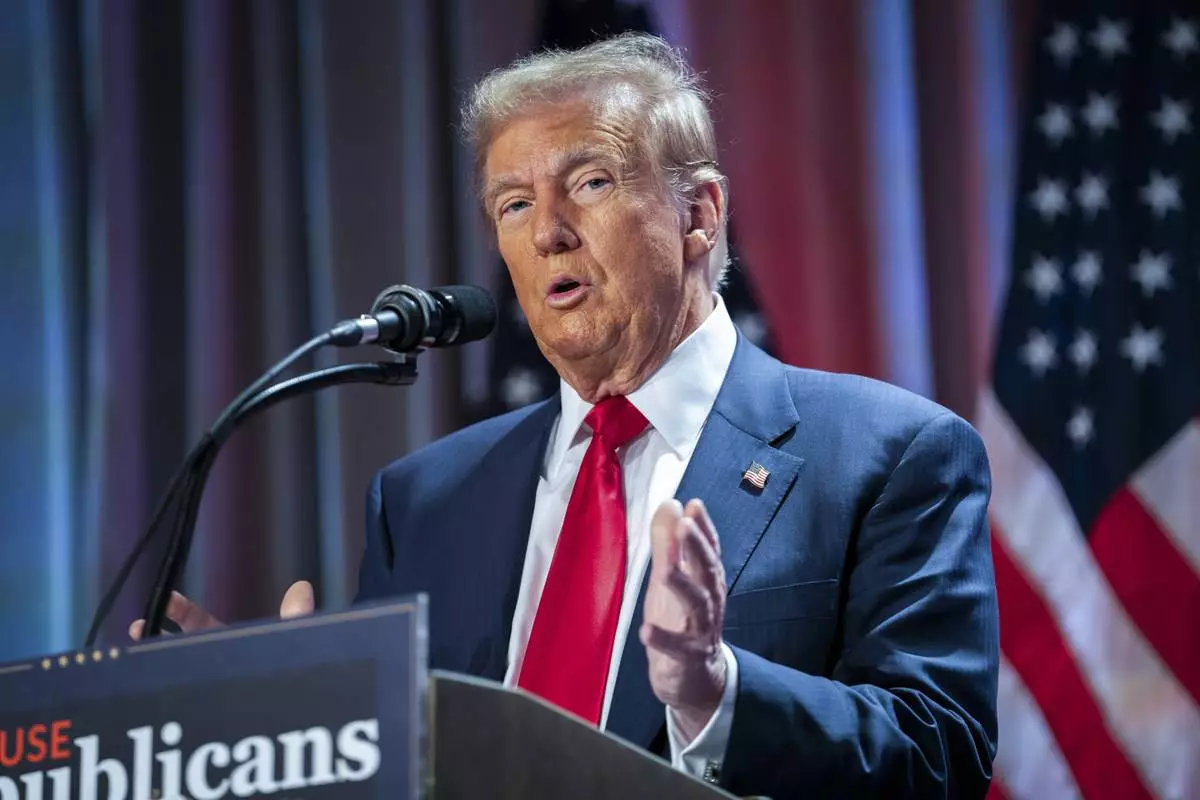
FILE - President-elect Donald Trump speaks during a meeting with the House GOP conference, Nov. 13, 2024, in Washington. (Allison Robbert/Pool via AP, File)
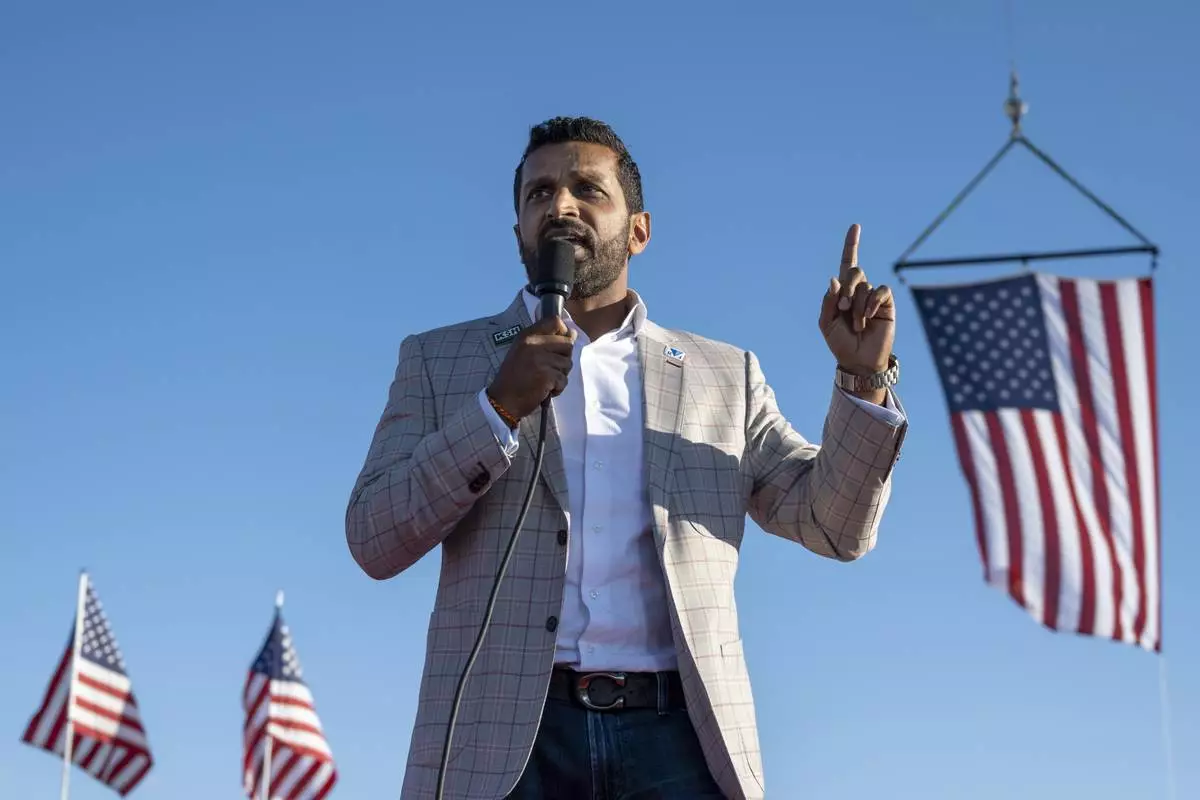
FILE - Kash Patel, former chief of staff to Acting Secretary of Defense Christopher Miller, speaks at a rally in Minden, Nev., Oct. 8, 2022. (AP Photo/José Luis Villegas, File)








